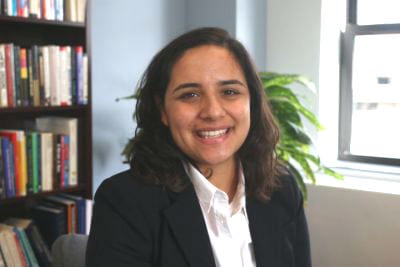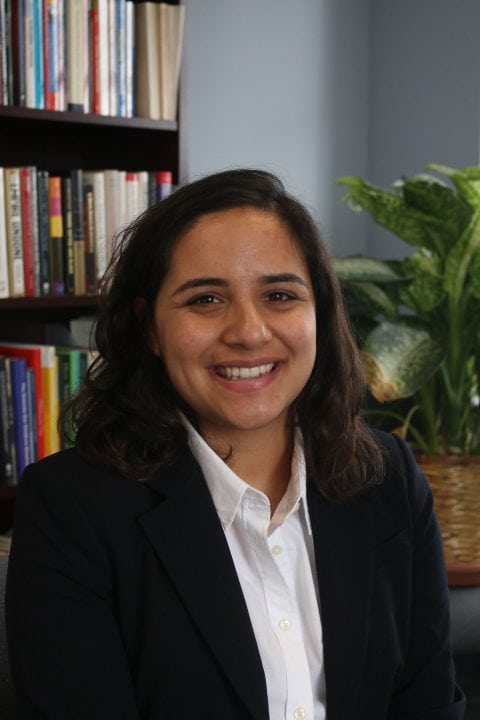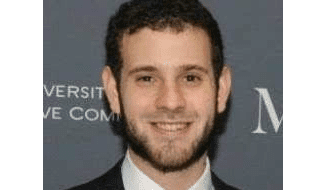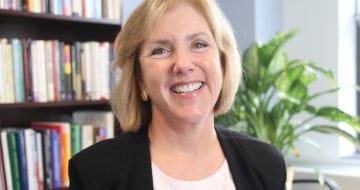This post was originally published in October 2017. To kick off Foster Care Awareness Month this May, AYPF wants to highlight the knowledge shared last year at our Capitol Hill forum by key leaders who serve and support systems-involved youth. In this blog post, Jesse Kannam provides a series of quotes by these leaders that challenge us to consider how systems, programs, and reframed policy conversations can better support youth involved in foster care and/or the juvenile justice system.
I have never been very invested in Twitter. I’ve had an account since I started college, but didn’t really commit to using it as a platform to share my voice or to learn about current events. It’s not until I moved to DC last January and starting working at AYPF that I began to understand its power. As a student in college who consistently exceeded the word count in papers, narrowing down my thoughts into 140 characters was daunting. But there’s something to be said about being concise and sharing important snippets of information to pique people’s interest to learn more.
On September 25th, the American Youth Policy Forum hosted a forum entitled Advancing Pathways to Education and Workforce Opportunities for Systems-Involved Youth. The forum explored the critical elements at the intersection of policy and practice for supporting systems-involved youth on a path to long-term success in education, careers, and civic life. As the designated live-tweeter at the event, I was all ears to hear bits of knowledge I could share with our followers who couldn’t be in attendance.
Below are some sound bites from our panelists, and how their inspiring words relate to a larger conversation about increasing opportunities for youth involved in the juvenile justice system and foster care.
“Nothing about us, without us.”
After two years of work in this space, AYPF has identified that leveraging youth voice is a critical component to promoting pathways to long-term success for systems-involved youth. This quote gets at just that. Multiple panelists, including Youth Leader Jefferson Alvarez, emphasized this point in explaining the importance of youth involvement and engagement in the creation of policies that affect their lives. Better-informed youth policies emerge from processes that value and continuously encourage the participation of the people affected by the policies. Systems-involved youth have unique insight into the issues and barriers affecting them, making their knowledge and expertise a valuable resource in the creation of policy.
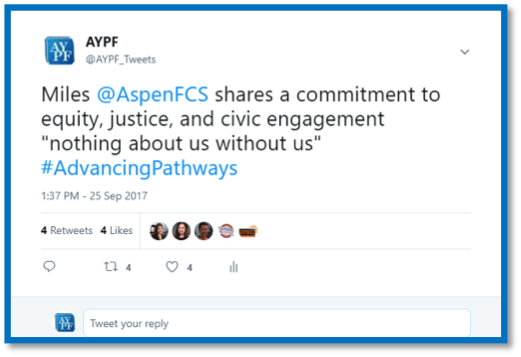 Monique Miles, Director of the Opportunity Youth Incentive Fund and Deputy Director of the Aspen Institute for Community Solutions, explained how youth perspective is engrained in their work. Miles referenced a meeting between policymakers and youth involved in the Southern Maine Youth Transition Network (SMYTN), one of the 21 community grantees of the Opportunity Youth Incentive Fund. During this meeting, foster youth explained the challenges they faced upon aging out of foster care, and losing the support services of the child welfare system. Youth in SMYTN and policymakers worked together to craft LD 1683, legislation that extends care to former foster youth until age 26.
Monique Miles, Director of the Opportunity Youth Incentive Fund and Deputy Director of the Aspen Institute for Community Solutions, explained how youth perspective is engrained in their work. Miles referenced a meeting between policymakers and youth involved in the Southern Maine Youth Transition Network (SMYTN), one of the 21 community grantees of the Opportunity Youth Incentive Fund. During this meeting, foster youth explained the challenges they faced upon aging out of foster care, and losing the support services of the child welfare system. Youth in SMYTN and policymakers worked together to craft LD 1683, legislation that extends care to former foster youth until age 26.
Gisele Castro, Executive Director of exalt, shared how exalt uses their curriculum—rooted in investigating the systemic issues their court-involved youth face—to allow youth to gain the language to explain their experiences, develop their voice, and become cultural critics. In 2016, a few students at exalt worked in collaboration with a student at the New School to create a documentary entitled 16 Bars (Youth) Off Ending the Justice to share the experiences of justice-involved youth and raise awareness about the Raise the Age campaign. This past April, Governor Cuomo signed legislation raising the age of youth that can be tried as adults to 18, to be fully in effect by October 2019. Similarly, Jefferson Alvarez shared his involvement in United Teens Equality Center (UTEC)’s campaigns for record expungement.
“It’s not youth that are disconnected, it’s the systems that are disconnected.”
– Monique Miles, Director, Opportunity Youth Incentive Fund &
Deputy Director, Aspen Institute for Community Solutions
During the forum, this quote challenged the audience to reconsider how we think about the barriers faced by systems-involved youth. Miles emphasized the importance of understanding the inequality imbedded within the systems these youth navigate, and how those inequities lead to youth not being involved in school or work.
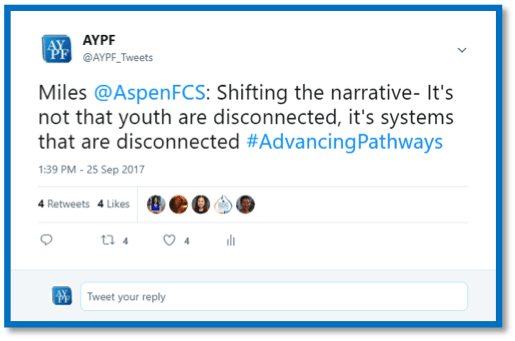 AYPF’s recent brief describes a few ways in which systems have and can work to better align their policies and practices to better serve youth navigating one or multiple systems. One way in which systems can become more aligned is through sharing of data. At the forum, Sam Cobbs, Chief Executive Officer at First Place for Youth (FPFY), shared that at FPFY data is used strategically to not only drive programmatic and policy vision, but also to inform practitioners in their implementation of programming on the ground. Effective data collection and use requires a cultural shift within organizations and communities in which data is collected and shared with relevant stakeholders, to understand gaps in service provision and inform alignment and collaboration across systems.
AYPF’s recent brief describes a few ways in which systems have and can work to better align their policies and practices to better serve youth navigating one or multiple systems. One way in which systems can become more aligned is through sharing of data. At the forum, Sam Cobbs, Chief Executive Officer at First Place for Youth (FPFY), shared that at FPFY data is used strategically to not only drive programmatic and policy vision, but also to inform practitioners in their implementation of programming on the ground. Effective data collection and use requires a cultural shift within organizations and communities in which data is collected and shared with relevant stakeholders, to understand gaps in service provision and inform alignment and collaboration across systems.
“Impact and outcomes are different. An outcome is what happens once a young person leaves [the program], but impact is what’s really important—it takes into consideration a student’s progress and context.”
– Sam Cobbs, Chief Executive Officer, First Place for Youth
In a discussion of how to support pathways to education and workforce opportunities, we inevitably got to conversation regarding how programs and communities can measure and gauge how well they are serving their youth. Do you measure how many people reach their high school diploma? Or GED? How quickly youth complete the program? These questions are especially difficult given that youth have a diversity of needs.
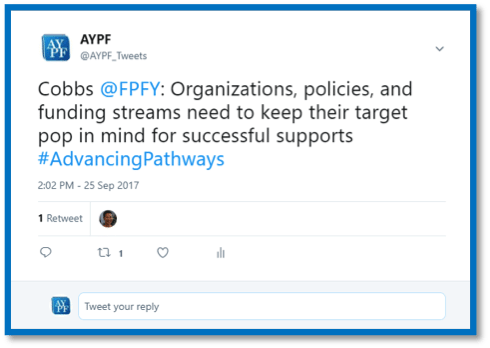 To this point, Cobb questioned the increasing popularity of the term “opportunity youth”—typically defined as youth ages 16-24 who are neither in school nor working—how broad it is, and its potential inability to allow us to serve the hardest-to-reach youth population. Some youth may only need very little support to “make it” and reach certain benchmarks or outcomes. Others will need immense support and services, and take longer to complete their secondary education, start postsecondary education, or begin working. How can you ensure that youth in a program or community are gaining meaningful skills, credentials, and opportunities, while also acknowledging the growth and progress that might not be evident in certain mechanisms of measurement? A few potential strategies highlighted by the panel included identifying your target population and tailoring supports to that population, and disaggregating data by subgroups.
To this point, Cobb questioned the increasing popularity of the term “opportunity youth”—typically defined as youth ages 16-24 who are neither in school nor working—how broad it is, and its potential inability to allow us to serve the hardest-to-reach youth population. Some youth may only need very little support to “make it” and reach certain benchmarks or outcomes. Others will need immense support and services, and take longer to complete their secondary education, start postsecondary education, or begin working. How can you ensure that youth in a program or community are gaining meaningful skills, credentials, and opportunities, while also acknowledging the growth and progress that might not be evident in certain mechanisms of measurement? A few potential strategies highlighted by the panel included identifying your target population and tailoring supports to that population, and disaggregating data by subgroups.
“You can’t mentor your way out of structural barriers.”
– Leticia Peguero, Executive Director, Andrus Family Fund
Given the structural and institutional inequities and barriers that are engrained within the systems that youth are coming into contact with, and often are the cause of youth entering these systems in the first place, Leticia Peguero, Executive Director of the Andrus Family Fund, asked panelists and the audience to consider how programs and communities can support the needs of this youth population.
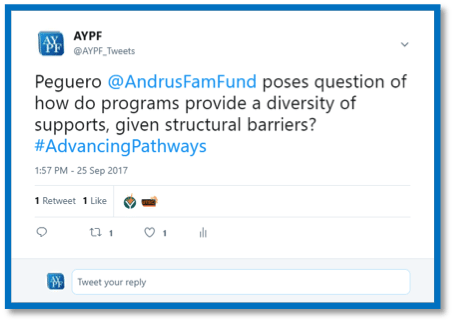 Gregg Croteau, Executive Director of UTEC, reflected upon how important offering work experiences and training are for the youth he serves. Similar to many other programs serving this youth population, UTEC runs a variety of social enterprises that allow youth to gain employer-desired skills that are transferable to other settings once they exit the program, and allow youth to earn money. To learn more about the diversity of supports and transitional services programs can provide, check out AYPF’s recent brief.
Gregg Croteau, Executive Director of UTEC, reflected upon how important offering work experiences and training are for the youth he serves. Similar to many other programs serving this youth population, UTEC runs a variety of social enterprises that allow youth to gain employer-desired skills that are transferable to other settings once they exit the program, and allow youth to earn money. To learn more about the diversity of supports and transitional services programs can provide, check out AYPF’s recent brief.
To learn more about the forum and the programs featured, please visit AYPF’s resource page. AYPF will also release a summary document of this event in the coming month.
And for those still new to the Twitter world like me, if you want to share this blog post or AYPF’s recent brief, here are a few sample tweets to help you get started!
- Miss @AYPF_Tweets recent forum on #AdvancingPathways? Here’s some sound bites from our panelists: http://bit.ly/2wvviE0
- Want to learn more about #AdvancingPathways for #foster & #JJ youth? Check out @AYPF_Tweets brief: http://bit.ly/2hKlAuZ


